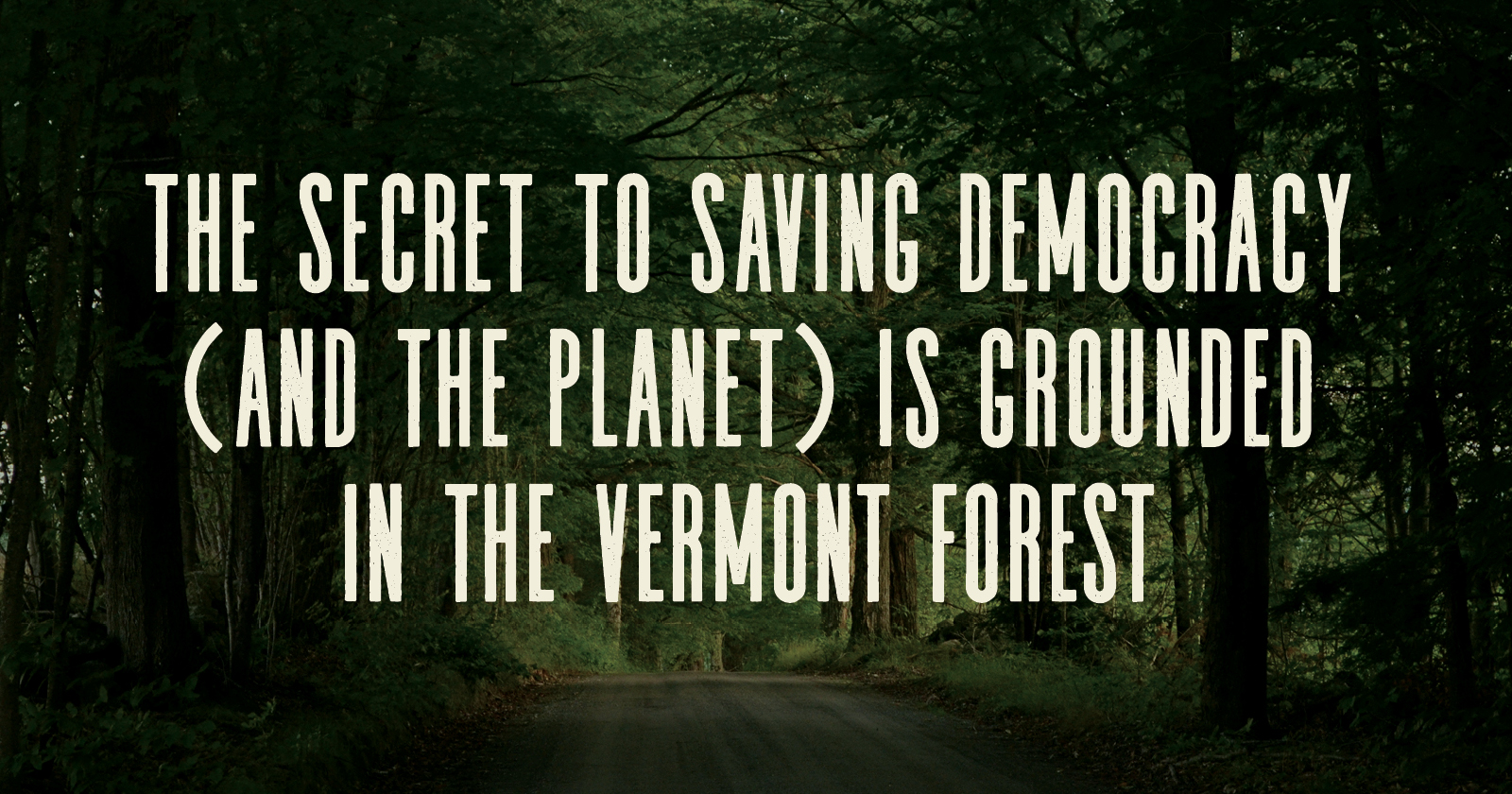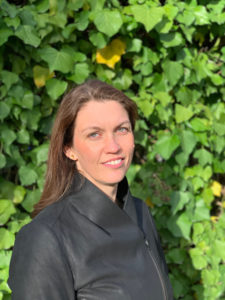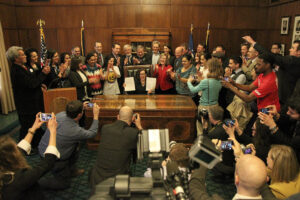
By Prudence Baird P’11
When future Earthlings look back on challenges facing the human race in 2020, the reason they may be able to look back at all is because of Caitlin Baggott Davis ’95 and millennials like her who are working to preserve the planet while saving humanity from itself.
“We’re on a steady path towards climate chaos and erasure of economic security,” says Baggott Davis, executive director of North Star Civic Foundation (North Star), a Portland, Oregon-based organization working to address pressing local, state, and national issues.
If Baggott Davis’s pronouncement seems like an exaggeration, consider the findings of a recent study by the Federal Reserve, revealing that millennials own only 4% of the nation’s real estate. At the same age, Boomers owned a third.
“This is a huge drop in opportunity from one generation to the next,” says Baggott Davis, explaining that home ownership is a gauge to predict the long-term fiscal health of a generation and of the economy overall. For millennials, a generation already in its peak earning years, the statistics are alarming.
Housing issues aren’t the only crises facing millennials—and millennials aren’t the only ones facing multiple crises, according to Baggott Davis. “The three problems we all face are a collapsing democracy, a dying planet, and unequal economic opportunity.” She describes these multiple crises as “linked both by the common characteristics of being urgent, polarizing, and technically complex, and because solving one will require solving the others, too.”
The Putney Post interviewed Baggott Davis to find out what’s in the secret sauce that’s seen the five-year-old organization introduce a landmark Oregon minimum wage law and how North Star plans to bring to heel other challenges to communities across Oregon.

PP: Tell us about your minimum wage project.
CB: In 2015 there were three competing proposals to increase the minimum wage. Essentially for $15, $13.50, and a very likely legislative deal closer to $11 per hour, which was too low for working people and people of color in Oregon’s urban areas.
These were political numbers, not measures of cost of living. Our belief was that no one who works full time should live in poverty. But more than a quarter of Oregon households couldn’t meet this basic goal.
We commissioned research to learn about costs of living in different parts of the state, in urban and rural areas. We met with employers in every region to understand how different proposals would affect their stability and looked at regional economic resiliency. Out of these conversations, we identified a new path forward—three different minimum wage standards pegged to the living costs in each region. That idea was passed into law in 2016.
A write-up in The Atlantic magazine heralded the new law, saying “Oregon’s tiered system . . . addresses one of the chief concerns some economists have about raising federal or state minimum wages: that rural areas will struggle to weather a decrease in jobs that may come with the increased cost of labor.”
PP: Is the minimum wage project emblematic of North Star’s projects?
CB: Very much so. This process highlights a core tenet of our organization. We believe in the power of data and deliberation with new people at the table and an open-minded approach that doesn’t leap towards the obvious solution.
PP: Your website says: We bring a spirit of discovery, disruption, and collaboration to accelerate broad-scale change in the areas of wealth inequality, climate change, and open democracy. What does this mean?
CB: North Star is an experiment with an entrepreneurial and “risk positive” approach. The issues we tackle are gnarly problems. Solving them requires taking risks—experimenting, seeing what works, and what fails. We think that philanthropy is pretty well positioned to take these kinds of risks, to be a laboratory for the public good.
We need to experiment and push the boundaries, to take public interest issues facing communities and accelerate change around solutions at the scale of problems, not tinkering around the edges. We bring in new information and new people. Sometimes this means bucking norms and truisms that others are holding as sacred.

PP: Can you give an example?
CB: In this presidential election, the word “electability” is on everyone’s lips. The mainstream media uses it this way: For Democratic candidates to be “electable,” they need to appeal to the conservative voters who “put Trump in office.” But the people who put Trump into office were the ones who didn’t vote in 2016 or voted for a third-party candidate. The math on that is clear. Trump’s election was caused by decreased participation on the left, not increased participation on the right. The truism that “electable” means more conservative is false.
What would it look like if we said that to be electable a candidate has to appeal to primarily Black and Latinx voters? To Green Party and Working Families Party voters? To millennials and Gen Z voters, who make up the largest national voting bloc?
PP: How do you get more people to participate?
CB: For North Star, our approach is to help direct resources to the communities that I was just talking about, to amplify their voices and build their civic power—voter registration, education, community organizing. Through our Vibrant Communities Fund, we move our own funds and also provide a path for other donors to move resources into communities where powerful, thoughtful, long-term organizing results in building permanent political strength. And we focus on geographies where that civic participation is likely to make a difference—where the conversation is most dynamic. It’s non-partisan and not tied to the election cycle.
PP: Tell us about the Bus Project, which you headed from 2013-2015.
CB: The Bus Project was an organization started by a group of friends in 2002. In a bar! We were in our early 20s, just out of college, looking to make a difference in George Bush’s America, after 9/11. Oregon had endured a Republican legislature for a decade. We got hundreds of volunteers to tour Oregon in a bus, knocking on doors for progressive candidates. The Senate flipped, and then the House.
We also registered our generation to vote. We got about 20,000 people registered every year. But it was frustrating because there were still nearly half a million Oregonians who were eligible but hadn’t registered. We just couldn’t raise enough money to reach everyone. I asked myself, “Why do charities fund this? Why doesn’t the state have skin in the game?” So we developed a policy, Automatic Voter Registration, by which the state automatically registers everyone—it’s great! Sixteen states have passed it now. It should be the national law.
PP: Did your time at The Putney School inform your experience working at the Bus Project and now at North Star?
CB: My approach to problem solving is grounded in the experiences I had at Putney. I think of Tom Wessels, our science teacher, who took us into the forest and asked us, “What happened here?” And then he wouldn’t talk for a while. We learned to see the story by looking at the details, the hints in the land. Why was there a rock wall here? Why were some trees burn-scarred? Why were trees on this side of the hill different from the other side?
I learned both curiosity and patience at Putney. And that leads back to looking at the housing crisis, at income inequality, at our democracy and asking a different set of questions about it.
For instance, we have a housing problem that many look at as a shelter and affordability problem. It is that, but it’s also fundamentally a wealth building problem for people of color and for this generation. This gets back to the federal reserve study about home-buying. Home ownership is economic security. What does it mean for an entire generation to be locked out? What happens if we focus on solving the shelter part of the problem, but ignore deep wealth inequality?
PP: Any last words of wisdom?
CB: Often, when we talk about civic life, change agents and missions, we are talking about challenges, about duty. I think one of the core traits of civic life is also joy. Joy from the affection, friendship, and connection of individuals trying to improve their communities together.
Also, I have taped to my desk a fortune from a cookie that reads: Do not fear failure. So, there’s that, too.
Learn more:

